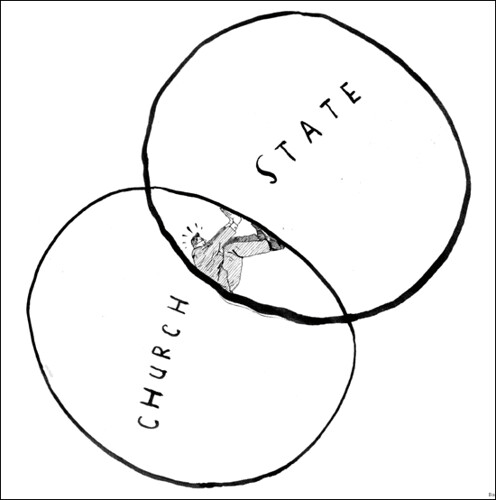
This blog entry was inspired by Gary North's brilliant analysis which you can read by clicking
here and by
this story on
All Things Considered that I listened to this evening while driving home. There are those moments in life where if you read and if you think clarity and truth can emerge. Ideas coalesced for me tonight. If you are interested in truth and/or clarity or if you are at least interested in understanding what I have perceived as truth (for me) and clarity (to me), please read the above-referenced Gary North column and listen to the above-referenced ATC story before continuing.
Go ahead. Listen to it.
Closely.
Here is my truth for tonight:
- Churches should reject tax-exempt status.
- Churches should reject ALL quid pro quos with government.
The tax exemption "given" to churches by relevant tax agencies (governments) is a temptation offered by agencies of evil. When churches accept the "gift" of tax-exempt status, churches sacrifice their freedom and their independence. The government requires that, in exchange for that "gift" of tax-exempt status, churches refrain from engaging in certain partisan political activities. (The law actually applies to all 501(c)(3) charitable organizations, I think. From the government's point of view, that's just fine. The broader the universe of people or institutions that can not engage in partisan political speech and thought the better.)
Governments are clearly brilliant at devising temptations. Gotta hand it to them. This particular gambit -- requiring churches trade the right to express partisanship ideas for dollars -- is especially clever. The old saw "separation of church and state" is even used as a justification for the rule (see this website). I think this is an inappropriate application of the phrase. The phrase, properly understood, implies that government should not be meddling with church affairs/religion. I don't think it's appropriate to interpret that phrase as meaning that churches should not have political views.
And apparently churches are more greedy than smart. This situation is pretty easy to understand. At least it should be. It should be pretty easy to see there is something sinister at work here. The government is giving handouts (tax exemptions) in exchange for promises (no partisan politicking). And churches have (apparently) ascribed more value to the tax exemption than to the freedom to take sides or advocate a position on political issues. The applicable ancient wisdom here is: "Lie down with dogs, wake up with fleas."
This is a corrupt position to take. It has to be. The most important thing is serving the flock. That is the primary reason for a church to exist. Delivering the message. Any restriction on the freedom to deliver the message should be anathema to the ordained. Allowing the government to restrict the content of the message is a mistake. The government is the enemy of the church, remember?
You can hear the fact of this corruption in the voice of the rector of the church in the NPR story. He is talking about how wrong it is that the IRS is taking the position that a sermon delivered by a guest paster in his church was prohibited political speech. He is fighting the government to continue to receive the benefit of the tax exemption. He should, instead, focus on what -- to me -- is the clear problem: the government is telling him what he can and cannot say to the members of his church. That should be an unacceptable imposition. Churches should prefer to pay taxes than sacrifice freedom in the content of their message [1].
You can also see evidence of the corruption here [2] in this legislation introduced before the U.S. House of Representatives. Again, they are fighting the wrong fight. You don't bargain with the devil. That is not the moral high ground. They are trying to get the benefit of the tax exemption without the burden of the restrictions on political speech. This is a mistake. Better to take the high ground, pay the beast and fight for its destruction/reduction. Applicable ancient wisdom: "You can't have your cake and eat it too."
 Time for the next picture. Look closely at this one. This is a great picture. It's a little unclear whether the man between the two circles is trying to keep the state out of the church or vice versa. I interpret that picture as demonstrating the relentless pressure of the state. To expand the scope of its influence. I believe those who act for the state would like it to completely eclipse the church. That's what the government does.
Time for the next picture. Look closely at this one. This is a great picture. It's a little unclear whether the man between the two circles is trying to keep the state out of the church or vice versa. I interpret that picture as demonstrating the relentless pressure of the state. To expand the scope of its influence. I believe those who act for the state would like it to completely eclipse the church. That's what the government does.
That's what governments have always done.
* * *
[1] This is not to accept that the present tax burden imposed by the crooks and moral bankrupts in our government is acceptable. My position on that is clear: an enormously excessive amount of private wealth is taken and wasted by the government. That's a different entry, however. I would note, however, that one possible excellent outcome of churches refusing the tax exemption is that if churches had to pay the overly onerous tax burden imposed on non-exempt members and supporters, they would probably very quickly become an extremely vocal proponent of reducing taxation and reducing government. That would be a good thing. Call it Exhibit "B" for why churches should reject the tax-exemption poison carrot.
[2] I was interested to see Ron Paul is a co-sponsor of this bill. I'd like to understand why. I suppose it could be the theory of not making the perfect the enemy of the good. I don't know. Ron Paul did author the words quoted below in this article however, so I'm willing to believe he had a good reason:
In modern America, however, most religious institutions abandoned their independence long ago, and now serve as cheerleaders for state policies like social services, faith-based welfare, and military aggression in the name of democracy. Few American churches challenge state actions at all, provided their tax-exempt status is maintained. This is why Washington politicians ostensibly celebrate religion – it no longer threatens their supremacy. Government has co-opted religion and family as the primary organizing principle of our society. The federal government is boss, and everybody knows it.






























